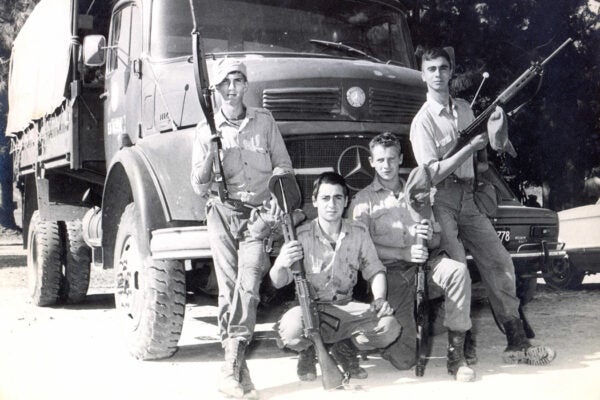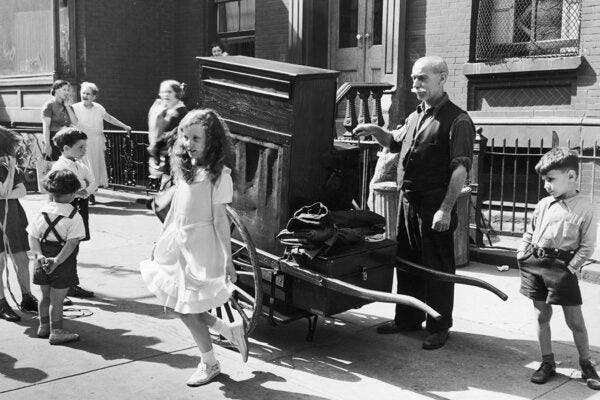When Profit Met Protest in Colonial New York
Economic self-interest shaped how New Yorkers responded to British taxes and imperial crackdowns.
Jefferson’s Fossils
What can Thomas Jefferson’s mistaken ideas about fossils tell us about science and belief in the early United States?
The Nineteenth-Century Science of Fashion
Victorian-era color theory moved from labs and studios into women’s magazines—and into everyday decisions about dress.
A History of Existential Anxiety
From medieval theology to modern philosophy, dread has long been a guide for living ethically.
A History of Fakery on Film
Concerns about AI-made images have deep roots in the earliest years of filmmaking.
A Brief History of Men Showing Leg
The story of the modern suit begins with tight pants, as men’s legs became markers of class, civility, and sexuality.
Medieval Friendships: No Girls Allowed
Medieval European elites inherited the classical concept of friendship as something possible only for men. Christine de Pizan and Margery Kempe beg to differ.
The Committed Officers of Argentina’s Dirty War
The viciousness of Argentina’s Dirty War resulted not only from orders from above but from ideological buy-in at the ground level.
A War on Street Music in NYC
In the New Deal era, New York City banned street musicians, classifying them as beggars. Some New Yorkers fought back.
A Secret Cipher for the KKK
How did the Ku Klux Klan spread across the South? Part of its journey depended on a code for secret correspondence.
In Praise of Loitering
A possible remedy to sexual harassment and assault in public spaces is to encourage more people of all kinds to spend time on the streets.
Playing with Consciousness
Out-of-the-ordinary mental states are the goal of many religious rituals, but they’re also important in “playful” situations like kids’ games and fraternal hazing.
Quakers Against Thanksgiving
In colonial America, government “thanksgivings” blurred faith and politics. For Quakers, rejecting them was an act of religious conviction.
Los Angeles’s War on Tramps
In the 1880s, Los Angeles began a large-scale project of incarcerating unemployed men whom they viewed as a threat to the vigor of white America.
The Art of Deforestation
Landscape paintings show how quickly American forests changed in the early nineteenth century—and the mixed feelings people had about that change.
Should Yoga Be More Than Exercise?
How should Westerners studying modern postural yoga think about the religious and medical systems in which it developed?
Waste Pickers Unite!
As one family’s story reveals, labor organizing and the development of a co-op for waste collection has improved conditions for precariously employed workers in India.
The Politics of Our AI Overlords
Fears of AI often focus on domination by algorithm-powered capitalism, but science fiction once used societies ruled by computers as analogs for communism.
Miners and Monkeys
There were compensations for the hardscrabble life of the Gold Rush—like monkeys and parrots brought to California for companionship and entertainment.
Defining “White Trash”
The term “white trash” once was used to disparage poor white people. In the Civil Rights era, its meaning shifted to support business-friendly racial politics.
Islamic Calligraphy in West Africa
The Hausa people of northern Nigeria have adapted—and continue to transform—sacred Islamic calligraphy that originated in the Arab world.
From Neoliberalism to Trumpism
The neoliberal politics that developed in the 1970s created financial instability and fragmented cultural markets, helping to pave the way for Trumpism.
Demonizing Immigrants in the 1880s
American newspapers portrayed members of immigrant groups as potential anarchists, linking the ideology to other anxieties and stereotypes about foreigners.
What Did the COVID Pandemic Do to Our Minds?
The pandemic’s transformation of daily lives around the world led to a loss of the bodily feeling of social trust across entire communities at once.
Hamilton’s Real Immigration Story
The popular musical poses Alexander Hamilton as a symbol of the value of immigrants brought to America, but over time, his party became increasingly xenophobic.

























